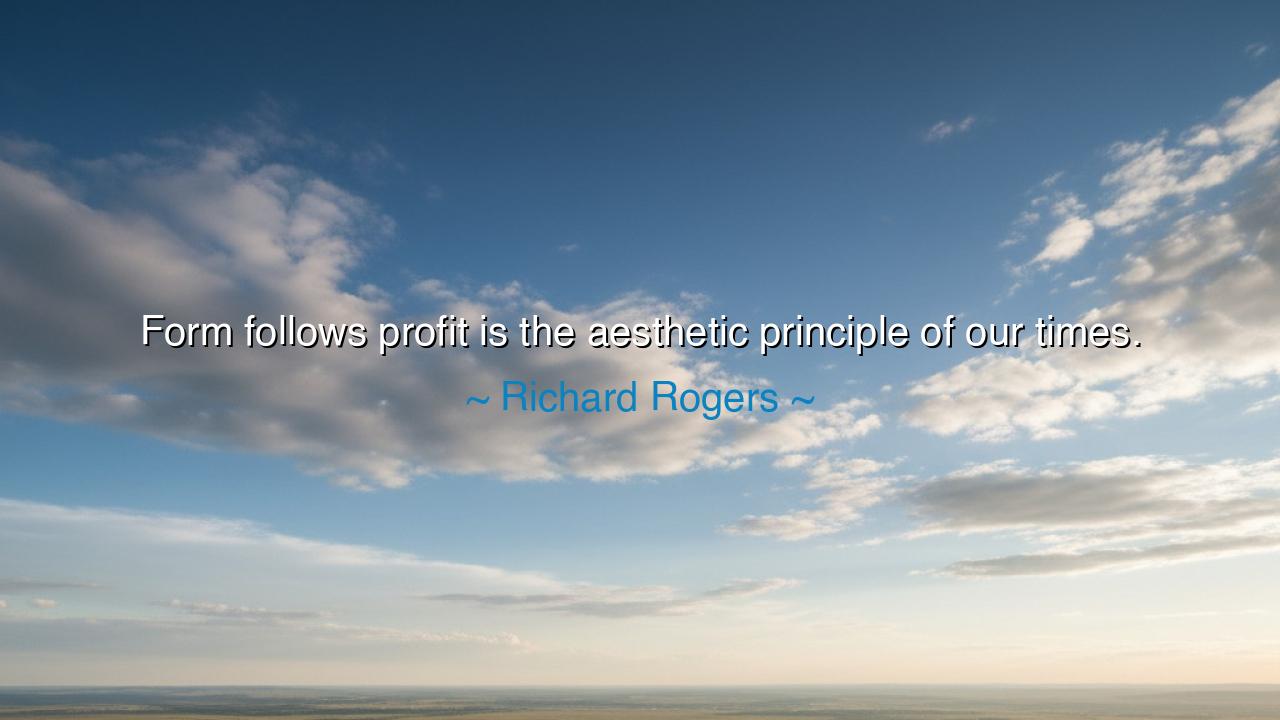
Form follows profit is the aesthetic principle of our times.






Host: The evening light was fading, the room growing softer as the last rays of the sun slipped behind the horizon. Jeeny sat at the table, sketching a few notes in her notebook, while Jack leaned against the wall, his arms crossed, eyes lost in thought. The quiet between them felt like a pause, a moment of reflection waiting to be filled. Finally, Jack spoke, his voice low, carrying a weight of contemplation.
Jack: (his voice thoughtful) "Form follows profit is the aesthetic principle of our times."
Jeeny: (pausing, looking up at him, her voice curious but gentle) "That’s a striking way to put it. The idea that design, art, even architecture, is driven not by beauty or function, but by the bottom line. It feels like the values of profit have shaped almost everything around us."
Jack: (nodding slowly, his tone reflective) "Exactly. It’s like the true essence of creation — the desire to create something that has meaning, that contributes to society — has been overshadowed by the need to make money. Architecture, for example. It’s not about the space, the experience, the community it serves. It’s about how much it can bring in, how it can sell. The form follows profit. And that seems to be the priority, no matter what the cost."
Jeeny: (leaning forward slightly, her voice calm but firm) "It’s a reflection of the times, isn’t it? The commodification of everything. When everything — even art or architecture — is seen as a product to be sold, the purity of creation, the reason behind it, is lost. The aesthetic becomes secondary to the financial."
Jack: (his eyes narrowing, his voice slightly frustrated) "It’s hard not to feel disillusioned by it all. When everything is built around profit, the heart of creativity gets drowned out. It’s like we’ve lost sight of what truly matters in favor of a model that just keeps churning out more, faster, and cheaper. But does that really make things better?"
Jeeny: (her voice softening, her gaze steady) "It’s a difficult question. I think we’re living in a time when people are starting to question that very thing — when we realize that profit isn’t the only measure of success. It’s hard to change something that’s so deeply ingrained in our society, but the question is: what are we sacrificing in the process? And is it worth it?"
Jack: (his voice quieter, almost resigned) "Maybe it’s not about getting rid of profit altogether. Maybe it’s about finding a balance. What if we could create things that are profitable and meaningful? What if form followed purpose, not just profit?"
Jeeny: (smiling gently, her tone encouraging) "I think that’s the hope, Jack. To find a way to merge creativity with purpose. To build things that not only serve financial needs but also contribute to the world in ways that matter. There’s still room for that kind of work, even in a profit-driven world."
Host: The room seemed to hum with the energy of their words, the conversation a delicate balance between the reality of their world and the hope for something better. Jeeny’s understanding, quiet and steady, stood in contrast to Jack’s frustration, yet in their exchange, they found a common thread — the possibility that creativity, in all its forms, could be driven by more than just profit. It could be driven by purpose, by meaning, by the desire to contribute to something greater than the bottom line.
Jack: (his voice filled with a quiet hope) "Maybe that’s where the future is. When form follows purpose, when we create for something more than just profit, that’s when we truly begin to build. And that’s when we find the soul of what we make."
Jeeny: (her smile brightening, her voice firm with conviction) "Exactly. It’s not just about what we build, but why we build it. And when we find the right balance, that’s when we begin to shape something that lasts."
Host: The room felt lighter now, the weight of their conversation shifting into something hopeful. Outside, the city continued to hum with its usual rhythm, but inside, Jack and Jeeny had found a shared understanding. The future, though uncertain, could still be shaped by something more than just profit. It could be shaped by purpose, by the belief that what we create matters beyond the bottom line. And in that, there was hope.






AAdministratorAdministrator
Welcome, honored guests. Please leave a comment, we will respond soon